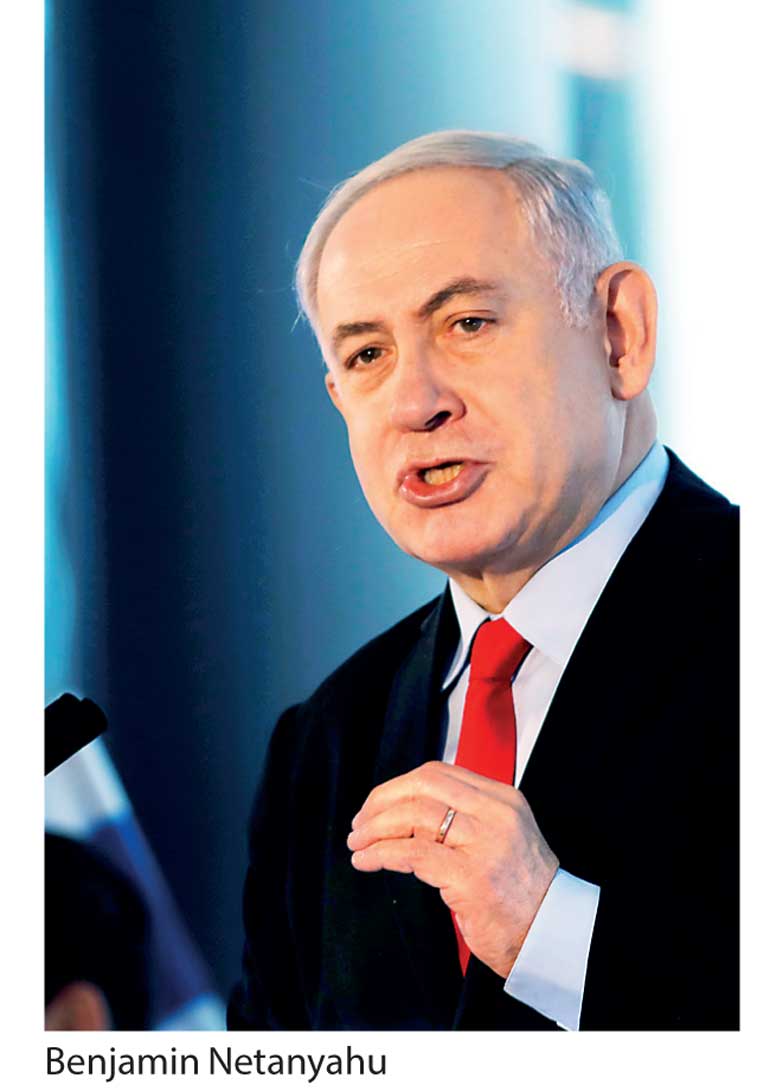Wednesday Feb 18, 2026
Wednesday Feb 18, 2026
Monday, 19 February 2018 00:00 - - {{hitsCtrl.values.hits}}
 Munich (Reuters): Prime Minister Benjamin Netanyahu said on Sunday that Israel could act against Iran itself, not just its allies in the Middle East, after border incidents in Syria brought the Middle East foes closer to direct confrontation.
Munich (Reuters): Prime Minister Benjamin Netanyahu said on Sunday that Israel could act against Iran itself, not just its allies in the Middle East, after border incidents in Syria brought the Middle East foes closer to direct confrontation.
Iran mocked Netanyahu’s tough words, saying Israel’s reputation for “invincibility” had crumbled after one of its jets was shot down following a bombing run in Syria.
In his first address to the annual Munich Security Conference, which draws security and defence officials and diplomats from across Europe and the United States, Netanyahu held up a piece of what he said was an Iranian drone that flew into Israeli airspace this month.
“Israel will not allow the regime to put a noose of terror around our neck,” he said. “We will act if necessary not just against Iran’s proxies but against Iran itself.”
For his part, Iran’s Foreign Minister, Mohammad Javad Zarif, called Netanyahu’s presentation “a cartoonish circus, which does not even deserve a response”.
“What has happened in the past several days is the so-called invincibility (of Israel) has crumbled,” Zarif, who addressed the conference hours after Netanyahu, said, referring to the downing of the Israeli F-16, which crashed in northern Israel after a strike on Syrian air defences.
“Once the Syrians have the guts to down one of its planes it’s as if a disaster has happened,” Zarif said, accusing Israel of using “aggression as a policy against its neighbours” by regularly carrying out incursions into Syria and Lebanon.
Israel has accused Tehran of seeking a permanent military foothold in Syria, where Iranian-backed forces support Syrian President Bashar al-Assad in civil war entering its eighth year.
Netanyahu said that as the Islamic State militant group has lost ground, Iran and its allies were surging into territory, “trying to establish this continuous empire surrounding the Middle East from the south in Yemen but also trying to create a land bridge from Iran to Iraq, Syria, Lebanon and Gaza.”
The tough words on both sides at the international event come as Israel is increasingly seeking to cooperate with Sunni Arab states that share its worries about Shi‘ite Iran. For months, Netanyahu has touted what he describes as unprecedented levels of behind-the-scenes cooperation.
“The fact that we have this newfound relationship with the Arab countries - something that ... I would not have imagined in my lifetime - this is not what they call a spin,” Netanyahu said, during a question and answer session after his speech.
“This is real, it’s deep, it’s broad: it doesn’t necessarily cross the threshold of a formal peace, and I doubt that would happen until we get some formal progress with the Palestinians - so the two are linked,” he added.
Israel has formal peace agreements with just two Arab countries, Egypt and Jordan. Others have said a pre-condition of any such treaty is an Israeli deal with the Palestinians.
Among Israel’s main concerns is Lebanon, where the heavily armed Iran-backed Shi‘ite militia Hezbollah is part of a coalition government. Israel last fought a war against Hezbollah in 2006. Tension between Israel and Lebanon has increased as Hezbollah has gained strength fighting in Syria, and the two countries also have a maritime border dispute.
Munich (Reuters): Iran’s Foreign Minister said on Sunday the shooting down of an Israeli jet after it bombed an Iranian site in Syria had shattered Israel’s “so-called invincibility”, reacting to a critical speech delivered earlier by Israel’s premier.
“Israel uses aggression as a policy against its neighbours,” Mohammad Javad Zarif told the Munich Security Conference, accusing Israel of “mass reprisals against its neighbours and daily incursions into Syria, Lebanon.”
“Once the Syrians have the guts to down one of its planes it’s as if a disaster has happened,” Zarif said.
He was responding to Benjamin Netanyahu’s address to the conference hours before, in which the Israeli prime minister, holding a piece of what he said was an Iranian drone, accused Iran of trying to impose an “empire” across the Middle East. “What has happened in the past several days is the so-called invincibility (of Israel) has crumbled,” Zarif said of Netanyahu’s remarks, which followed the Feb. 10 downing of an Israeli F-16 jet. David Ivry, a former Israeli Air Force chief, told Reuters earlier this month he believed it was the first time an Israeli F-16 was brought down since Israel began using the jets in the 1980s.
Anti-aircraft fire downed the jet as it was returning from a bombing raid on Iran-backed positions in Syria. It was one of at least eight Israeli planes despatched in response to what Israel said was an Iranian drone’s incursion into its airspace earlier on that day.
The jet was hit by a Syrian anti-aircraft missile and crashed in northern Israel, according to an Israeli official.